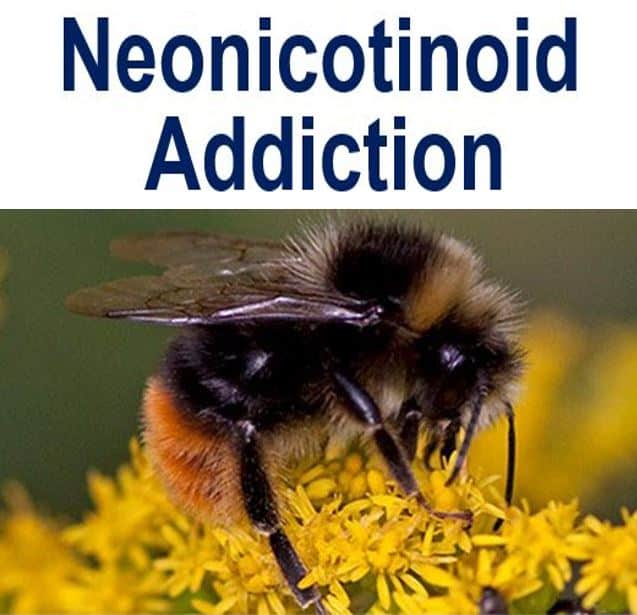Neonicotinoid pesticides work on Bees’ brains in the same way nicotine from tobacco does on the human brain, making them addicted, say British and Irish scientists. This means they are likely to gorge themselves and dangerously increase concentrations of toxins within their bodies.
Neonicotinoids act on certain kinds of Bees’ brain receptors, just like nicotine does, i.e. they act on brain cells so that the insects want more.
Researchers from Trinity College Dublin, Ireland, Newcastle University and the University of Oxford, both in England, wrote in the journal Nature that this preference for nectar laced with neonicotinoid pesticides increases bees’ risk of exposure to harmful levels of poisons.

Just like humans crave their next nicotine ‘fix’, bees appear to do the same with neonicotinoid pesticides.
Professor Geraldine Wright, from the Institute of Neuroscience at Newcastle University, and team discovered that honeybees and buff-tailed bumblebees cannot avoid nectar containing neonicotinoid pesticides because it has no taste.
Bees’ behavior with neonicotinoid-laced food
The researchers found that bees clearly had a preference for food containing neonicotinoids. When presented with both neonicotinoid-free and neonicotinoid-laced food, they consumed considerably greater quantities of the food with the pesticide in it.
While both types of bees showed signs of addiction, the bumblebees appeared to be affected more – they ate greater quantities of neonicotinoid-laced food compared to the honeybees. This means that bumblebees are especially at risk of poisoning themselves.
Farmers globally are highly depended on pollinating insects, including bees, for top crop yields. According to agricultural studies, they represent at least $164 billion (€153bn, £109bn) annually worldwide.
Bees can be exposed to potentially harmful pesticides in pollen and floral nectar. A number of studies have shown that neonicotinoid pesticides are bad for colony fitness and bee foraging.
Concern has been growing over recent years regarding the harmful effects neonicotinoids may have on insect pollinators.
The EU (European Union) imposed a temporary ban on neonicotinoid pesticides being used on flowering crops in April 2013. The conclusions of several studies which are underway will decide whether to turn the ban into a permanent one, or to lift it.
Serious risk of poisoning
Professor Wright explained:
“Bees can’t taste neonicotinoids in their food and therefore do not avoid these pesticides. This is putting them at risk of poisoning when they eat contaminated nectar.”
“Even worse, we now have evidence that bees prefer to eat pesticide-contaminated food. Neonicotinoids target the same mechanisms in the bee brain that are affected by nicotine in the human brain.”
“The fact that bees show a preference for food containing neonicotinoids is concerning as it suggests that like nicotine, neonicotinoids may act like a drug to make foods containing these substances more rewarding.”
“If foraging bees prefer to collect nectar containing neonicotinoids, this could have a knock-on negative impact on whole colonies and on bee populations.”
Lead researcher at the School of Natural Sciences, Trinity College Dublin, Prof. Jane Stout, said:
“Our findings imply that even if alternative food sources are provided for bees in agricultural landscapes where neonicotinoid pesticides are used, the bees may prefer to forage on the neonicotinoid-contaminated crops.”
“Since neonicotinoids can also end up in wild plants growing adjacent to crops, they could be much more prevalent in bees’ diets than previously thought.”
Field study on neonicotinoid pesticide
In a separate study, carried out at Lund University in Sweden, scientists found that clothianidin, a neonicotinoid pesticide, affected wild bees in an agricultural landscape. Their findings were also published in Nature.
Coordinator and head researcher Maj Rundlöf said their findings are worrying, given that wild bees – both bumblebees and wild bees – play a vital role in the pollination of crops.
Dr. Rundlöf said:
“We saw a clear negative impact on growth and ability to reproduce in bumblebee colonies near treated rapeseed fields.”
Not only were there problems with reproduction and growth, there was also significantly fewer wild bees on the rapeseed field treated with clothianidin.
However, they found no detrimental effects on the colony growth of honeybees.
Dr. Rundlöf added:
“If we only investigate how a new pesticide affects honeybees, that is not sufficient to predict the consequences for wild bees in a real landscape.”
Thorsten Rahbek Pedersen, project manager at the Swedish Board of Agriculture, said:
“The results show that it is inappropriate to use clothianidin on rapeseed. We need alternative preparations and new cultivation methods if we are to continue growing spring rapeseed in Sweden.”
Citations:
1. Erin Jo Tiedeken, Jane C. Stout, Sébastien C. Kessler, Jessica Mitchell, Kerry L. Simcock, Sophie Derveau, Samantha Softley, & Geraldine A. Wright. “Bees prefer foods containing neonicotinoid pesticides.” Nature. Published online April 22nd, 2015. DOI: 10.1038/nature14414.
2. Maj Rundlöf, Georg K. S. Andersson, Riccardo Bommarco, Ingemar Fries, Veronica Hederström, Lina Herbertsson, Ove Jonsson, Björn K. Klatt, Thorsten R. Pedersen, Johanna Yourstone & Henrik G. Smith. “Seed coating with a neonicotinoid insecticide negatively affects wild bees.” Nature. Published April 22nd, 2015. DOI: 10.1038/nature14420.
Video – Pesticides harm wild bees
Maj Rundlöf talks about their field study findings.
